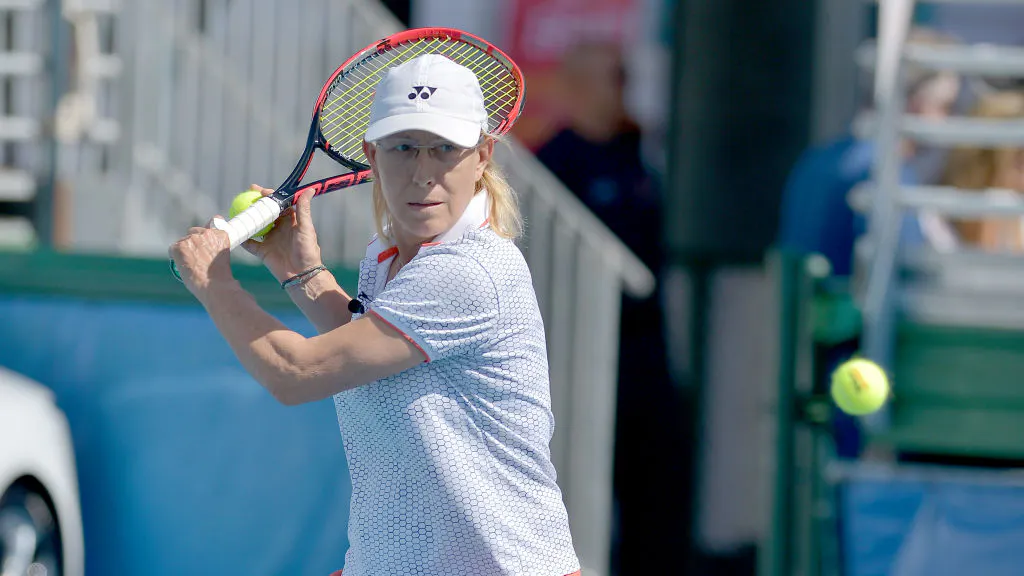Speaking on The Dean Obeidallah Show, tennis icon Martina Navratilova asserted that the leaders in Communist Czechoslovakia, her native country, cared more about their citizens than President Trump does about Americans.
Obeidallah queried, “Martina, I mean, and this is a sincere question: In the Communist Czechoslovakia, do the leaders actually care about the people? Because Trump doesn’t seem to care about us and who dies in our country. So is there more compassion from the communist leaders to the people than Trump shows to the people living in America?”
“Absolutely,” Navratilova answered. “Absolutely … they had a cushy life. If you become a member of the Communist Party, it was mostly men; it was hardly any women in there, but we did have women, in like, professors and doctors, but not in a position of power in the government because there was no other position of power, right? But you still felt that they wanted to do well by people. I never felt like they didn’t care if you’d lived or died. So, no, this kind of psychopathy was not the case back then.”
Navratilova was born in 1956; she did not become an American citizen until 1981. The Private Prague Guide writes of the period starting roughly in 1968:
During the harsh normalization period of political repression after the crushing of the Prague Spring and its liberal reforms in August of 1968, more purges were carried out. In the purges from 1969 to 1971, however, no one was hanged. Instead, the accused were expelled from the Communist Party and lost their jobs. They were subject to interrogations and intimidation techniques and were followed by the secret police. High-ranking government personnel and leaders of social organization were victims of these purges, and the reformists that had supported the Prague Spring were targets. Authors whose writings did not conform to socialism found their works banned, and other artists, such as actors and directors, were not permitted to take part in productions. Unlike the 1950s, the police saved violence for those who stubbornly opposed the intervention of Soviet troops in 1968. …
During the 1970s and 1980s, many Czech and Slovak artists were put in prison or forced to emigrate. Dissidents were often harassed and sometimes imprisoned for speaking out against the regime. Those who signed the Charter 77 declaration of human rights were arrested, interrogated and lost their jobs.
Here’s an excerpt from Britannica‘s summary of this oppressive period:
Having purged the reformists during 1969–71, [Gustav] Husák concentrated almost exclusively on the economy. In the short term, Czechoslovakia did not suffer significantly, even from the disruption caused by the military occupation in 1968. The country undertook important infrastructure improvement projects, notably the construction of the Prague metro and a major motorway connecting Prague with Bratislava in Slovakia. Husák, however, did not permit the industrial and agricultural reforms from the Action Program to be applied and so failed to cure the country’s long-term economic problems. The achievements of the mid- to late 1970s were modest, and by the early 1980s Czechoslovakia was experiencing a serious economic downturn, caused by a decline in markets for its products, burdensome terms of trade with several of its supplier countries, and a surplus of outdated machinery and technology.
Although Husák had avoided the bloodletting of his predecessors, his party purges had damaged Czechoslovak cultural and scientific life, since positions in these two areas depended on membership in the party. Numerous writers, composers, journalists, historians, and scientists found themselves unemployed and forced to accept menial jobs to earn a living. Many of these disappointed intellectuals tried to continue the struggle against the regime, but they were indicted for committing criminal acts in pursuance of political objectives. Though these trials could not be compared to the Stalinist show trials, they kept discontent among the intellectuals simmering, even if the mass of the population was indifferent. Intellectual discontent gathered strength in January 1977, when a group of intellectuals signed a petition, known as Charter 77, in which they urged the government to observe human rights as outlined in the Helsinki Accords of 1975. Many intellectuals and activists who signed the petition subsequently were arrested and detained, but their efforts continued throughout the following decade. Among the victims of the crackdown was the philosopher Jan Patocka, who died on March 13, 1977, after a number of police interrogations.
In March, Navratilova commented on American gun culture. The comment came in response to English actor John Cleese, a co-founder of the comedy troupe Monty Python, mocking Americans for buying guns during the coronavirus crisis. “It strikes me that it’s terribly funny that the response of some Americans to a virus is to buy guns,” tweeted Cleese. He followed that judgment with another: “Buying guns seems to be the default position for some of the American electorate… When confronted by something upsetting, they buy guns Bears…same-sex marriages….global warming…albino raccoons…long words…Hispanics…ANY kind of panics… Let’s go shopping !!!”
Cleese was echoed by Navratilova, who wrote, “Can’t figure that one out either. Gun culture- what an oxymoron!!!”
It strikes me that it's terribly funny that the response of some Americans to a virus is to buy guns
— John Cleese (@JohnCleese) March 25, 2020
Buying guns seems to be the default position for some of the American electorate…
When confronted by something upsetting, they buy guns
Bears…same-sex marriages….global warming…albino raccoons…long words…Hispanics…ANY kind of panics…
Let's go shopping !!!
— John Cleese (@JohnCleese) March 25, 2020
Can’t figure that one out either. Gun culture- what an oxymoron!!! https://t.co/LTkfMsWOfW
— Martina Navratilova (@Martina) March 25, 2020

.png)
.png)

